After serving their sentence, felons discover multiple limitations imposed on them. Each offense implies its own limitations, but a common restriction among all felonies is felony disenfranchisement, that is, the suspension of voting rights.
Disenfranchisement is widely used across the United States, though how exactly it is used vastly varies from state to state. And as a felon who has recently finished their sentence, you may be wondering: can a felon vote?
There isn’t a single answer to this question since policies vary from state to state, as we already mentioned. So we’ll try to provide you with information on felon voting right policies for each state.
What is felony disenfranchisement?
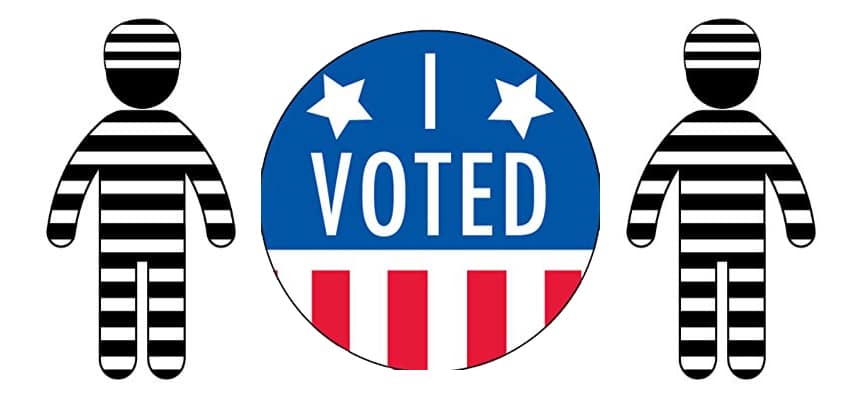
Felony disenfranchisement is the restriction of an individual’s voting rights due to a conviction in a felony. Felonies are offenses that are punished by incarceration of more than 1 year or/and a fine over $1000.
Felony disenfranchisement is one of the collateral consequences of a conviction. Disenfranchisement is common for felons across the United States. And since the United States is among the most punitive countries in the world when it comes to felonies, its limitations are more restrictive than in many other countries around the world.
In fact, to give you some perspective, here are figures of felony disenfranchisement as of 2016:
* As of 2016, there were 6,1 million Americans disenfranchised due to a felony conviction. This number has risen dramatically over the years. There were around 1,17 million disenfranchised individuals in 1976, 3,34 million in 1996, and 5,85 million in 2010.
* 1 in 40 adults, or the US voting age population’s 2.5% is disenfranchised due to a current or past felony conviction.
* In the 12 states(as of 2016)that disenfranchise people after the sentence, disenfranchised individuals account for over 50% of the US’s entire disenfranchised population.
* Disenfranchisement rates vary vastly across states due to variations in legislation. For example, Florida accounts for 27%of the whole disenfranchised population of the US.
* 1 in 13 African Americans of voting age is disenfranchised. Over 7,4% of the adult African American population of the US is disenfranchised. For the non-African American population, the share is just 1,8%. In four states – Kentucky (26%), Virginia (22%), Florida (21%), and Tennessee (21%) –more than 1 in 5 African Americans are disenfranchised.
At the same time,certain states have repealed or amended disenfranchisement laws in recent years, allowing 840 thousand American citizens to regain their voting rights.
Opinions on felony disenfranchisement vary significantly among experts and the general public. Both proponents and opponents have valid points on the issue, which we will examine a little bit later.
With all that being said, felons may restore their voting rights, but the restoration process varies widely across states. Some states only restore voting rights based on individual petitions, while others don’t restrict voting rights at all, even in prison. Now, let’s find out how voting rights restoration policies vary from state to state.
Read Also: Felon Friendly States
In which states can a felon vote?
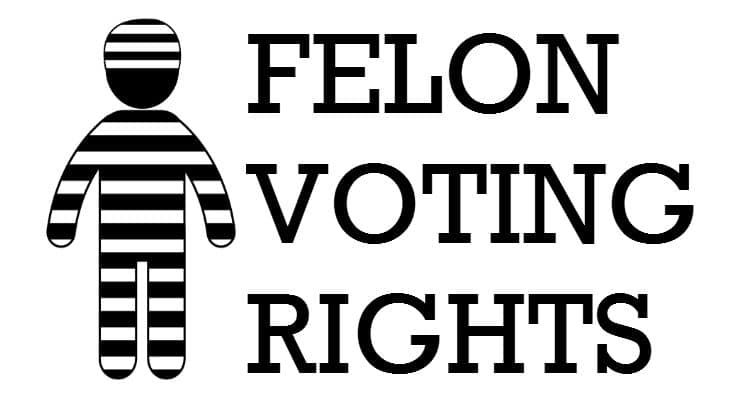
| Voting rights never lost | Voting rights restored automatically upon release from prison | Voting rights restored automatically upon being released from prison and discharged from parole | Voting rights restored automatically upon the completion of the sentence, parole, and probation | Voting rights restoration dependent on the type of conviction or the outcome of an individual petition | Voting rights only restored through an individual petition |
| Maine | District of Columbia | California* | Alaska | Alabama | Iowa |
| Vermont | Hawaii | Colorado | Arizona | Delaware | Kentucky |
| Illinois | Connecticut | Arkansas | Mississippi | ||
| Indiana | New York | Florida | Nevada | ||
| Maryland | Georgia | Tennessee | |||
| Massachusetts | Idaho | Wyoming | |||
| Michigan | Kansas | ||||
| Montana | Louisiana | ||||
| New Hampshire | Minnesota | ||||
| North Dakota | Missouri | ||||
| Ohio | Nebraska | ||||
| Oregon | New Jersey | ||||
| Pennsylvania | New Mexico | ||||
| Rhode Island | North Carolina | ||||
| Utah | Oklahoma | ||||
| South Carolina | |||||
| South Dakota | |||||
| Texas | |||||
| Washington | |||||
| West Virginia | |||||
| Wisconsin | |||||
| Virginia | |||||
| *Voting allowed from county jails | |||||
Felon Voting Rights by State
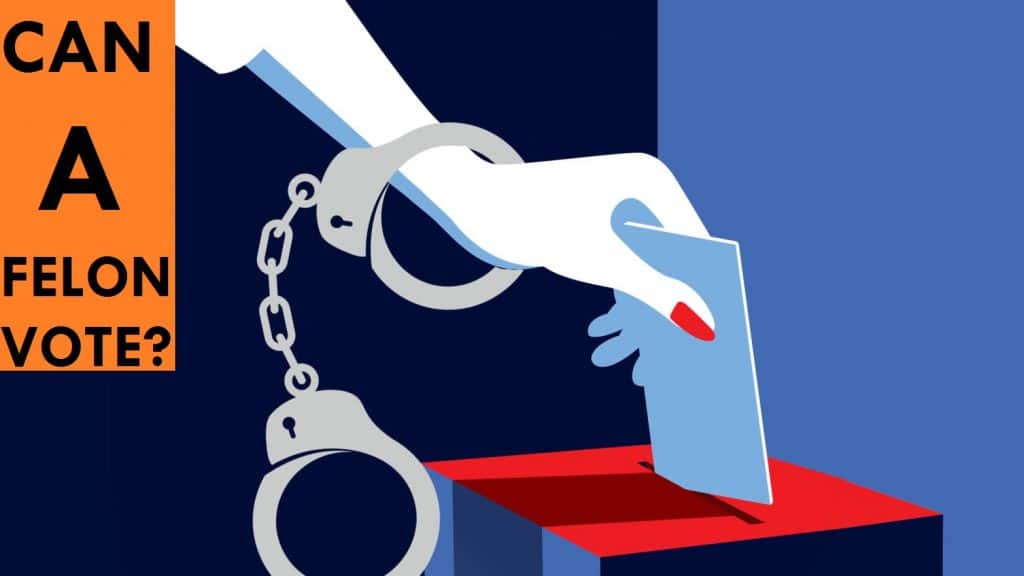
There are certain specifics in each state. Those are described below.
Alabama
In the state of Alabama, some felons have the right to apply for the restoration of their voting right immediately upon completion of their full sentence. Certain felony charges such as murder, manslaughter, and rape make a person ineligible for re-enfranchisement.
Alaska
Felons who are no longer serving a sentence and have been unconditionally discharged from supervision by the Department of Corrections may vote in Alaska. The Alaska Division of Elections requires proof of unconditional discharge from the supervising entity.
Those convicted in crimes involving moral turpitude, as well as individuals on probation or parole for the same crime are ineligible to vote in Alaska.
Arizona
In Arizona, first-time, single-felony offenders receive automatic vote right restoration upon the completion of the sentence and payment of all fines. Two-time or more offenders would need to apply for the restoration of their voting rights with their county.
Arkansas
Those convicted of a felony are ineligible to vote while in prison, parole, or probation. Upon the completion of the supervised release, voting rights are restored automatically.
California
With the passing of the California Assembly Bill No. 2466, felons serving time in county jails received the right to vote from jail.
Read more: Felons Voting Right in California
Colorado
In Colorado, felons may vote while on probation, but not from prison and on parole. Voting rights are restored automatically upon the completion of parole.
Connecticut
In the state of Connecticut, felons are eligible to have their voting rights restored upon paying all fines and being released from imprisonment, as well as the completion of parole.
Delaware
The April 16, 2013, Hazel D. Plant Voter Restoration Act amended the Delaware Constitution, removing the 5-year pending period for regaining voting rights. Now, the voting rights of those convicted of a felony are automatically restored after serving the full sentence.
According to Article V Section 2 of Delaware Constitution, certain felonies such as murder, manslaughter, sexual offense, etc. remain permanently disenfranchised.
District of Columbia
In the District of Columbia, voting rights are restored automatically upon release from prison, even if the individual is on parole or probation.
Florida
The November 8, 2018, Amendment 4 allowed individuals with prior felony convictions (except for sex offenses and murder)to gain their voting rights automatically after completing the terms of their incarceration, including parole and probation. Read more on Florida Felon Voting Rights.
Georgia
In Georgia, it is required that felons fully complete their sentence, including parole, probation, as well as pay legal financial obligations in order to have the right to vote.
Hawaii
In the state of Hawaii, felons may vote while on probation or parole but not from jail.
Idaho
In Idaho, the voting rights of felons are restored upon final discharge, which includes satisfactory completion of the imprisonment, probation, and parole. However, there are felonies to which voting rights restoration is not applied, including rape, kidnapping, robbery, burglary, trafficking, and many others.
Illinois
Felons lose their right to vote until being released from imprisonment. That is, felons are allowed to vote while on parole or probation.
Indiana
In the state of Indiana, felons have the same voting rights as in Illinois, that is, they may vote upon release from imprisonment and while on parole or probation.
Iowa
On January 14, 2011, Terry Branstad, the Republican Governor of Iowa, issued Executive Order 70, rescinding Executive Order 42 signed in 2005 by Democratic Governor Tom Vilsack.
The Executive Order 42 allowed automatic voting restoration after sentence completion. Now, with the order 70, in order to have the right to vote, felons must complete their sentence, including parole and probation, as well as pay all outstanding monetary obligations to the court.
Kansas
In Kansas, the right to vote is automatically restored upon release from prison at the expiration of the sentence. Alternatively, the voting rights are restored upon final discharge from parole or probation.
Kentucky
On December 22, 2015, the newly-elected Kentucky Governor Matthew G. Bevin issued Executive Order 2015-052, rescinding Executive Order 2015-871 signed on November 24, 2015, by the previous Governor.
The rescinded order implied the automatic restoration of voting rights for non-violent felons who have completed their sentence, probation, parole, and have no outstanding monetary obligations to the court.
With the new executive order, those convicted of a felony must apply to the Governor individually for the restoration of their voting rights.
Louisiana
On May 31, 2018, Louisiana Governor John Bel Edwards signed the House Bill 265, which went into effect on March 1, 2019.In accordance with this bill, all individuals who have been convicted of a felony in Louisiana and who have not been incarcerated during the previous 5 years will be allowed to vote. This applies even when serving a term of probation or parole.
Maine
Maine is one of the two US states where voting rights of felons are never taken away. Felons in Maine may vote even while imprisoned. (See how to register to vote in Maine)
Maryland
On February 9, 2016, the Maryland General Assembly overrode the Maryland Governor’s veto of the Senate Bill 340, restoring the voting right to all felons immediately upon release from prison without having to complete parole or probation.
Massachusetts
In accordance with General Laws Part I Title VIII Chapter 51 Section 1, felons are not eligible to vote while incarcerated in a correctional facility. In other words, felons in Massachusetts may vote upon release from prison, even while on parole or probation.
Michigan
Like in Massachusetts and some other US states, as listed above, felons have their voting rights restored after being released from imprisonment. Read More on Michigan Voting Rights
Minnesota
In Minnesota, unless you are currently imprisoned or serving probation, parole, or supervised release, you are eligible to vote.
Mississippi
Felony convicts are disfranchised only in the specific cases listed in Article XII Section 241 of the Mississippi Constitution, including murder, rape, theft, bribery, armed robbery, and others.
After the completion of the sentence, an individual convicted of such a felony may address the state representative and convince them to author a bill that restores the right to vote for that individual. In accordance with Section 253 of Article XII of the Mississippi Constitution, a two-thirds vote of both houses is required to restore the voting right to a felon.
Missouri
In the state of Missouri, felons are eligible to vote upon completion of the sentence and probation or parole. However, felons convicted of an election offense are not eligible to vote, whether the offense is a felony or misdemeanor.
Montana
In Montana, a person convicted of a felony is ineligible to vote while imprisoned or while on parole or probation.
Nebraska
In Nebraska, the voting right is restored automatically two years after the completion of all the terms of the sentence. Those convicted of treason under the laws of Nebraska or the United States must apply for a restoration of their civil rights individually.
Nevada
According to the Nebraska Code NRS 213.090, individuals convicted of a non-violent felony have their voting rights restored automatically upon completion of the sentence.
However, in accordance with the Nebraska Code NRS 213.155, civil rights – including voting rights – are not restored in certain cases, such as a Class A felony, two or more times of a felony, felonies involving violence, etc.
New Hampshire
In New Hampshire, felons are allowed to vote upon release from imprisonment, even while on parole or probation.
New Jersey
In the state of New Jersey, felons are eligible to vote upon the completion of their sentence, parole, and/or probation.
New Mexico
Once again, the voting rights of felons are restored automatically upon release from prison and the completion of parole or probation.
New York
The Executive Order 181 issued on April 18, 2018, allows the restoration of voting rights to parolees upon review of the records of the Governor’s Office. Previously, voting rights were restored after the completion of parole.
North Carolina
In North Carolina, all voting rights are automatically restored after completing all the terms of the sentence, including parole, probation, and restitution.
North Dakota
In North Dakota, felons are barred from voting only during actual imprisonment, meaning that they may vote on parole or probation.
Ohio
In Ohio, felons again have the right to vote as long as they are not incarcerated. Thus, they may vote while on parole, probation, or other supervised release.
Oklahoma
In the state of Oklahoma, convicted felons who have been pardoned may register for voting. However, after serving the full sentence, felons are not eligible to vote for a period equal to the length of the sentence.
Oregon
Felons are eligible to vote upon the completion of their sentence, including parole or probation.
Pennsylvania
In Pennsylvania, felons may vote upon release from prison and while on parole or probation.
Rhode Island
In the state of Rhode Island, felons are eligible to vote upon release from prison, even if on parole or probation.
South Carolina
In South Carolina, those who have served their entire sentence, including probation or parole, are eligible to vote. Felons who have been pardoned may also vote. However, those convicted of a felony or offense against election laws are not eligible to vote.
South Dakota
The South Dakota HB 1247 enacted on March 19, 2012, took away the voting right for felons serving terms or probation. Prior to the enacting of this bill, only those incarcerated or on parole were barred from voting. And now, convicted felons must serve their full sentence, parole, and probation before having the right to register to vote.
Tennessee
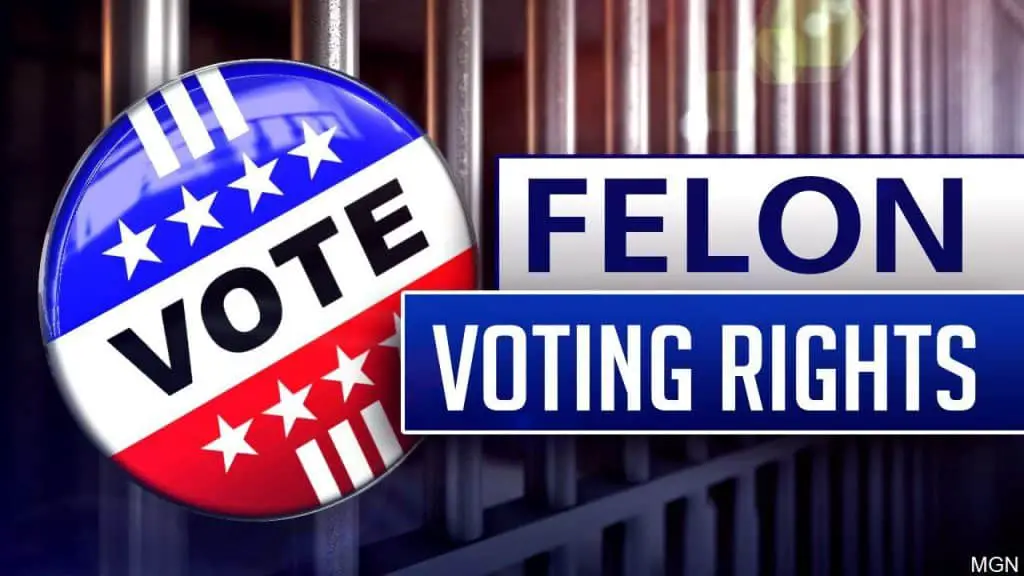
In the state of Tennessee, voting rights for felons are as follows:
- Convictions prior to January 15, 1973. Unless convicted of certain crimes like robbery, rape, arson, bribery, etc., a convicted felon has the right to vote.
- Conviction between January 15, 1973, and May 17, 1981. All individuals convicted during this period are eligible to vote regardless of what kind of a felony they committed. One’s conviction period will need to be verified by the Division of Elections.
- After May 18, 1981. Upon completion of the sentence, convicted felons must apply for voting rights restoration. However, there are certain limitations to this, like treason, first-degree murder, and voter fraud.
Texas
In Texas, felons are eligible to vote immediately after completing their sentence, including any term of parole, probation, or supervision. Those pardoned are eligible to vote as well.
Utah
In Utah, the voting rights of felons are restored upon completing the term of incarceration.
Vermont
Vermont is the second US state where felons are never barred from voting. Felons may thus vote even while imprisoned.
Virginia
In the state of Virginia, felons are not eligible to vote unless their rights have been restored by the Governor, as per the Section 1 of Article II of the Constitution of Virginia.
The Department of Corrections must provide convicted individuals with information on the restoration of voting rights. In addition, it assists felons with the process for the review applications established by the governor.
It should be noted that in 2016, Virginia Governor Terry McAuliffe announced an executive order aimed at restoring felons’ voting rights automatically after the completion of the sentence and supervised release.
Subsequently, the Virginia Supreme Court ruled that voting rights need to be granted to individuals rather than en masse.Now, it is required to fill out this online form to restore voting rights.
Washington
Upon the completion of the sentence, including parole or probation, all individuals with felony convictions must re-register to vote.Complete fulfillment of financial obligations is not necessary, but your voting rights may be revoked if the sentencing court determines that you have failed to comply with your financial obligations’ terms.
West Virginia
In West Virginia, felons are eligible to vote upon the completion of their sentence, including parole or probation.
Wisconsin
In Wisconsin, felons who have not yet completed the terms of their sentence, including probation or parole, are ineligible to vote.
Wyoming
In the state of Wyoming, first-time nonviolent felons have their voting rights automatically restored if they have completed their supervision or have been discharged from an institution on or after January 1, 2010. Those who have completed their sentence before January 1, 2010, must apply for the restoration of their voting rights.
Why are the voting rights of felons restricted in the first place?
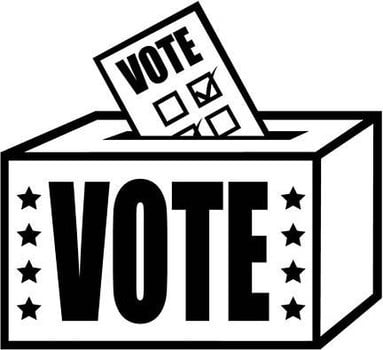
So why are the voting rights of felons even restricted? Well, you are going to hear a lot of opinions on this, but the main argument is that felons have demonstrated poor decision-making and untrustworthiness when committing a felony and that they should not have a voice in making political decisions.
Felons are also often compared to children, non citizens, and the mentally incompetent since they all are legally considered untrustworthy for voting. Felon voting restrictions are also deemed consistent with such limitations as no sex offenders near schools and no guns for violent offenders.
Some proponents of voting disenfranchisement also argue that it is reckless and irresponsible to automatically grant felons the right to vote immediately after release to prison. They argue that there should be a waiting period or a hearing to determine whether felons will commit a new crime or will become law-abiding citizens of the country.
And it should be noted that these are valid concerns since recidivism rates are quite high in the US. For instance, in the state of Florida, recidivism rates in 2014 were 24.5% within three years of being released.Recidivism rates in Florida have declined from 30.5% in 2007, but 24.5% isn’t too low either.
How can the justice system determine whether a felon will commit a crime and become one of that 24.5% or not? There are no objective ways of doing so. And when some states require felons to prove that they are back on track, it sounds quite reasonable.
And there also is the issue of violent crimes or crimes like treason or voter fraud. Individuals who have committed such felonies are commonly barred from voting permanently.But generally, individual petitions may allow any felon to get their voting rights back.
Again, it is reasonable not to trust felons with the right to vote. However, it is equally unreasonable to completely distrust felons and consider that they can’t become good citizens.
Why should felons be allowed to vote?
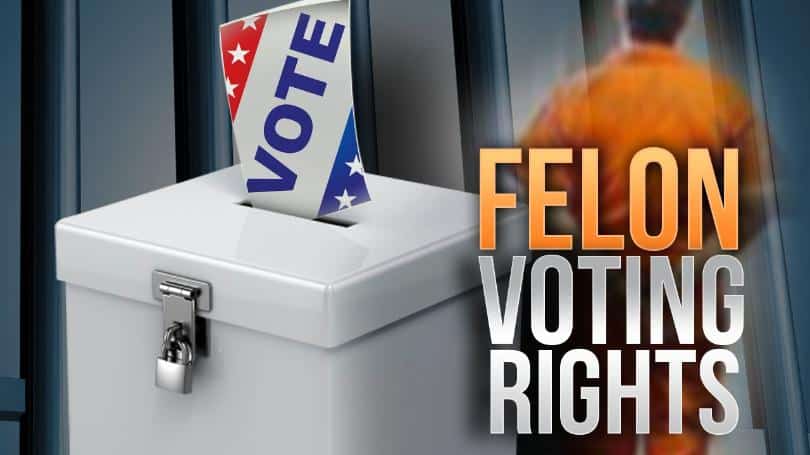
Why Should Felons Be Allowed to Vote? There are equally as many opponents of felony disenfranchisement as there are proponents. And once again, the reasoning of those who protect the rights of felons has a strong basis.
Most often, it is argued that restricting felons’ right to vote hinders their rehabilitation and integration with society. And this concerns not only the voting right. Convicted felons have difficulties finding a job and overall suffer from distrust towards themselves.
And what would this sense of isolation and disconnection from the society do? Would it help felons reevaluate their life and become productive members of society? Most likely, no, since further punishment after serving the actual sentence are going to keep felons away from social life. Instead of an opportunity for rehabilitation, a felon would just continue to be punished, albeit while having more freedom.
It is also argued that felons should not be limited in their rights after serving the sentence for their offense.By serving the sentence and paying fees, felons basically pay their debt to society. And after “paying back”, does it really make sense for them to continue being punished?
Another point is financial obligations. Some argue that paying legal financial obligations shouldn’t be a prerequisite for being allowed to vote as well. Wealthy people or those who have access to money won’t have difficulties paying their debts, while poor people will not. So should one’s ability to vote be restricted by financial capabilities?
Crimes do need to be punished in a just and tough manner, especially serious crimes. Manslaughter isn’t the same as theft, and it would probably be reasonable to be strict towards those who committed violent crimes.
It should be noted that in some states, felonies are indeed categorized by their violence when it comes to voting rights. In a given state, felons may generally get their voting rights back after serving their sentence, but certain offenses may disqualify an individual from voting rights restoration.
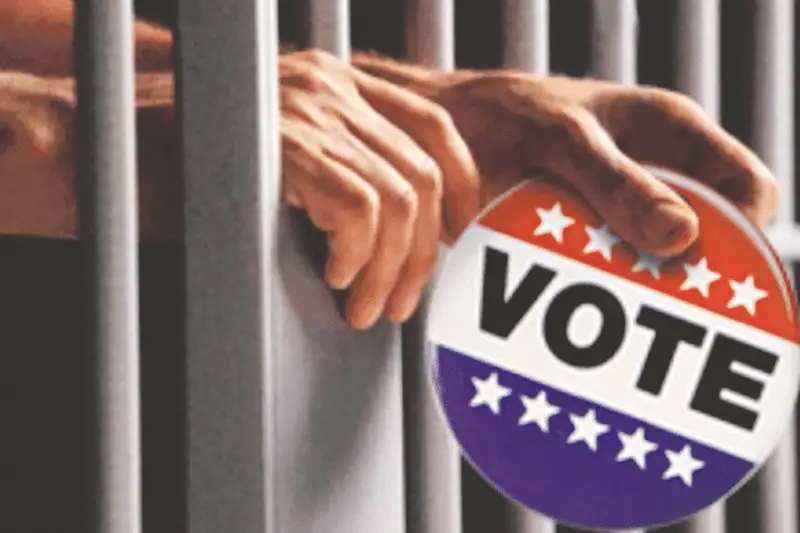
However, it probably wouldn’t be too reasonable to permanently restrict the voting rights of those who committed serious crimes since it would again hinder their reintegration with society. What could be done though is to make the process of the restorations of voting rights stricter for them.
Opponents of felon disenfranchisement also suspect that there are political and racial reasons behind barring felons from voting. Namely, it concerns the prevalence of the supporters of Democrats/Republicans among those disenfranchised. The prevalence of the supporters of one or the other party varies from state to state.
The racial discrimination stance is backed up by the fact that there are many more African Americans among those disenfranchised than non-African Americans.Proponents of disenfranchisement argue that this is due to the higher criminality rate among African Americans.
As for us, we think it is more reasonable to allow felons to vote after serving their sentence. Again, they’ve paid their debt to society, and instead of keeping them disconnected from the community, their re-connection with it should be encouraged.
Felons do need to receive just punishment for their wrongdoings. And in certain cases, some offenders arguably should be prevented from voting, but not permanently. The more serious offenses should probably be reviewed on a case-by-case basis, as it is done in most states.

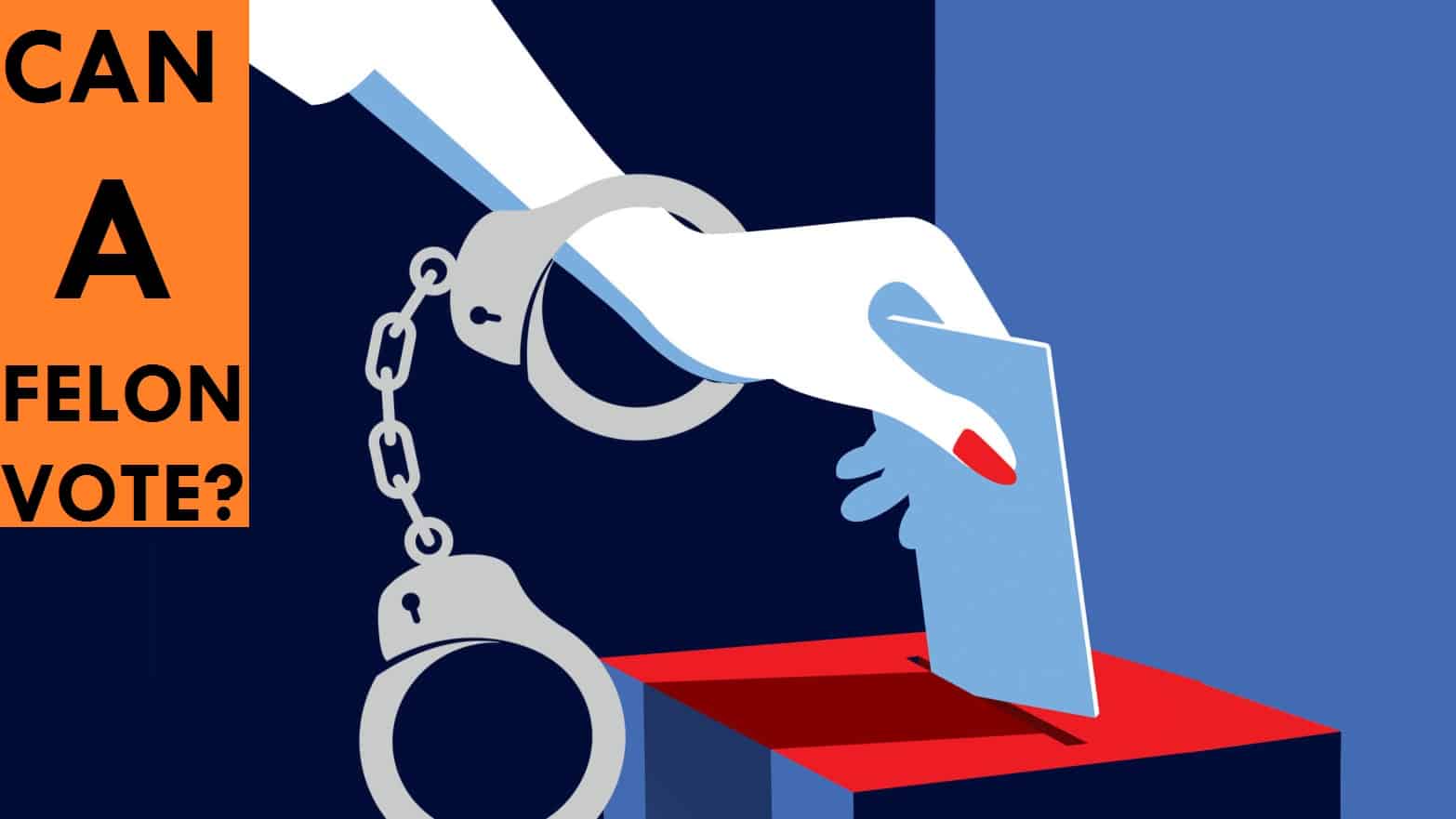
Since our founding fathers fought for no taxation without representation, if I were a convicted felon in a state where I could not vote I’d bring a lawsuit in both federal and state court that I should be exempt from federal and state taxes since I’m being taxed without representation.
That sounds right to me. But imagine how hard you would have to fight for that lawsuit. Its ridiculous how we have too many politicians in our government system who fight against Americans rights just to show their power and ignorance. Laws and rights already given to the people years/ hundreds of years ago, are being stripped from us behind our backs. There are alot of EVIL people trying to control us. We need to stand up and act respectively for our rights.